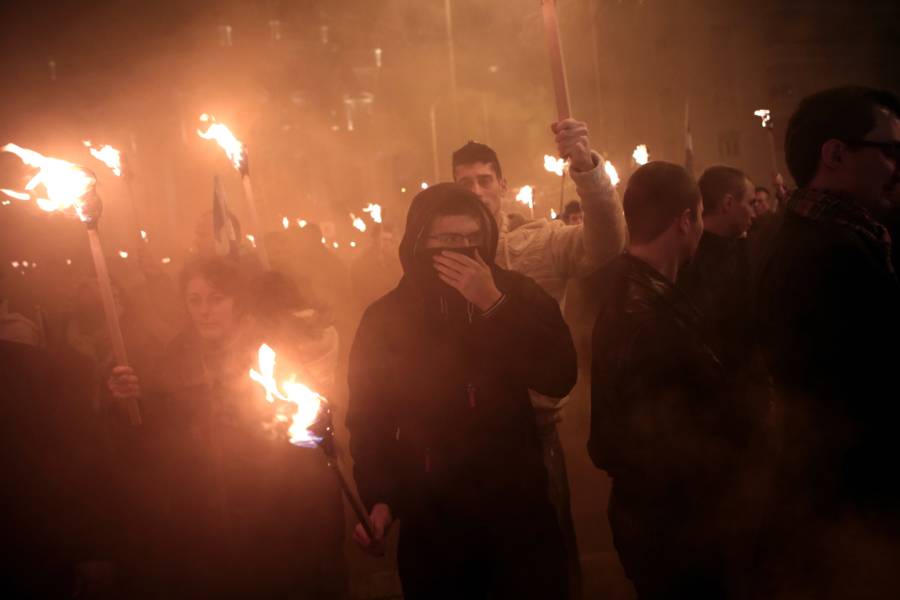Holocaust Deniers Today — And What Can Be Done About Getting Through To Them

Milos Bicanski/Getty ImagesA supporter of the Golden Dawn party holds the group’s flag during a demonstration on February 1, 2014 in Athens, Greece.
To experts in the field, it’s as easy as it is naïve to think that the reasons to deny the Holocaust have either changed or disappeared with time.
“The Holocaust is one of the most well-documented phenomena and documented not just by the victims but also by the perpetrators themselves,” Tad Stahnke, director of USHMM’s initiative on Holocaust denial and antisemitism, told ATI. “There are no real factual disputes around the broad outlines of the Holocaust, so if someone is denying it, they’re doing it for another reason.”
Indeed, Stahnke says that insidious political objectives drive fuel many Holocaust deniers today:
“From the Far Right in Europe, there’s a Golden Dawn party in Greece that’s extremely anti-Semitic and got around ten percent [of votes] in recent Greek elections,” Stahnke said. “Since they came to prominence in 2012, their leaders have made a number of statements questioning the Holocaust or denying the Holocaust. They’re using it to, in addition to promoting anti-Semitism, which I’m sure they’re happy to do, to try to impose some racial purity on Greece.”
Stahnke adds that generally bad economic conditions — similar to those in post-World War I Germany — make anti-Semitism a more appealing rhetorical device to forge “unity” among the electorate:
“[Anti-semitism] is a way for the Golden Dawn party to try to position themselves in a political environment, to pick up people who are dissatisfied with current governments in power. So they take on this idea that they’re speaking the ‘truth,’ which they’re willing to say even if it’s not ‘politically correct’ … because they’re speaking up on behalf of the vague notion of the Greek people.”

ANGELOS TZORTZINIS/AFP/Getty ImagesMembers of the Golden Dawn party hold torches during a gathering on January 31, 2015 in Athens, Greece.
According to Stahnke, Greece’s Golden Dawn party is just one of many examples of contemporary anti-Semitism — and one which Stahnke worries has the potential for discursive normalization:
“One thing that disturbs me is that denying the Holocaust or questioning the Holocaust, there are more and more instances where that happens, and the person doing it is not shut out of the political debate.
It’s not a negative to [their supporters]. Like in Hungary where you have a party getting around 20 percent of the vote that has said in the past publicly that the government should put together a list of Jews in the government, they have a public platform, then this anti-Semitic rhetoric and conspiracy theory can become part of the mainstream political discourse. This is a very disturbing phenomenon…and one that can lead to anti-Semitic violence.”
So what can be done to combat it? According to Stahnke, it’s about winning the information war:
“We’ve got to be clear on the facts. For example, last year there was an effort to erect a statue with some public funding in a Hungarian town and the person honored was architect of the early anti-Jewish legislation in Hungary, before WW2.
The [U.S. Holocaust Museum and Memorial] put out a dossier for journalists and policymakers and a statement, and were very clear about what this person’s role was, based on the scholarly evidence. And made sure that civil society groups were challenging this, journalists reporting on it had a good factual basis for what was going on. And we continue to do that in circumstances where media and others may not be as well informed. So we think that’s one important thing.”
Second, Stahnke says, it’s necessary to reach the right communities, which means identifying areas which may be particularly vulnerable to Holocaust deniers and make the event’s significance meaningful to them.
To that end, Stahnke cites a project the museum has done with popular Iranian news outlet Iranwire. Together, they produced a short film about Abdol Hossein Sardari, an Iranian diplomat who lived in Paris during World War II and ended up saving the lives of several Iranian Jews.
It’s vital to “be proactive and develop information that is relevant and promoted by sources they listen to,” Stahnke says.
And not for nothing, either. As historian Deborah Lipstadt said, “In almost every society, where they’ve gone after Jews first, they’ve gone after other people after that.”
Next, hear the harrowing tale of Ilse Koch, “The Bitch of Buchenwald” and one of the Holocaust’s greatest monsters. Then, go beyond the Holocaust and read up on the four worst war crimes in history.





